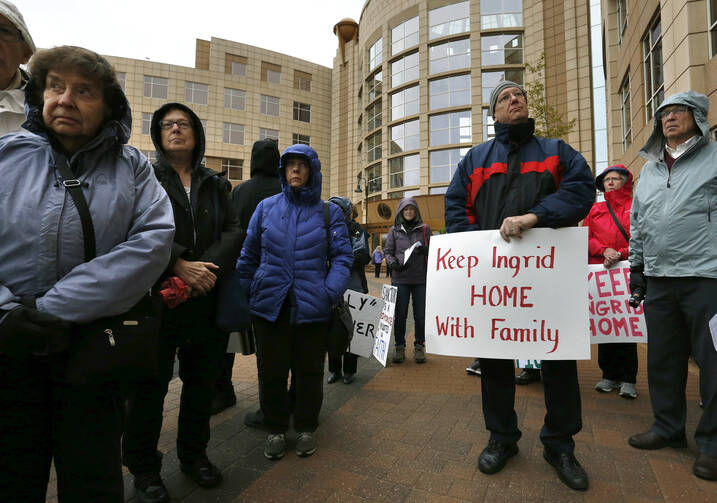One would be hard pressed to find an area in which the Trump administration has had a greater impact in its first few months than immigration. The Department of Homeland Security is ramping up for a major expansion of nation-wide deportation efforts, and people entering the country have been subject to greater scrutiny (in some cases, even when they are American citizens). Both undocumented immigrants and other foreign nationals in our country have to be more cautious in their daily lives than has been necessary in many years.
Indeed, despite the president’s many assurances that he was only interested in immigrants with criminal records, the Washington Post reported last week that roughly half of all immigrants taken into custody by ICE since Inauguration Day had committed only traffic offenses or had no criminal record at all.
But one place in the United States so far remains almost entirely untouched by the administration’s actions: our southernmost state, Hawaii. Hundreds of miles from the continental United States, Hawaii has approximately 21,000 undocumented immigrants, according to the Migration Policy Institute, about four-fifths of them are from Asia. Many working in the islands’ agricultural and service industries. Each island has its own character in this regard. The farms of Maui have attracted many Mexicans; immigrants from Micronesia have gone to the “Big Island”; and Filipinos, by far the largest group of undocumented immigrants in the state, have tended to settle in Oahu.
“So far we do not know of anybody on Oahu that has been visited by ICE or picked up.”
Hawaii has seen no uptick in ICE activity since the election, according to Melba Bantay, immigration services program director at Catholic Charities Hawaii: “So far we do not know of anybody on Oahu that has been visited by ICE or picked up. There are stories on the Big Island that ICE officers came, but they were unfounded. On Maui, people said ICE appeared, but they didn’t pick up anybody.”
That’s right. Catholic Charities Hawaii, the only agency in the state accredited by the U.S. Department of Justice to represent undocumented immigrants before U.S. Citizenship and Immigration Services, has not heard of a single raid in the entire state since Inauguration Day, nor of a single person having been picked up by ICE. Not one.
Not only that, but recent months have seen actual improvements on the islands in immigration policy. In April, U.S. Citizenship and Immigration Services announced that rather than continuing to force non-citizens to come to Oahu for all matters relative to their immigration status (such as the procurement of green cards, work permits and citizenship applications), it would pilot for the next six months a mobile office that would come to each island, saving immigrants not only time but money. “We’re just amazed they’re doing this in the middle of what’s going on,” Ms. Bantay said.
Diane Terada, a community services administrator at Catholic Charities Hawaii, agreed: “It was a bright moment for us given the things going on for immigrant communities.”
The pilot program can be attributed in part to the work of Mazie K. Hirono, one of the state’s two Democratic U.S. senators, but the broader question remains: How can things in Hawaii be working so much better?
Ms. Terada theorized that there is a cultural component to the difference: “We’re islands that have large Asian and Pacific Islander populations. The nature of those populations is to try and get along.”
Hawaiian culture is particularly concerned with making people feel at home. “‘Aloha,’ of course, means hello and goodbye,” said Catholic Charities Hawaii C.E.O. Terry Walsh, “but it also means welcome.”
Ms. Terada believes another reason has to do with the nature of life on an island: “The people who work for [Citizenship and Immigration Services] or other offices here go home to the same neighborhoods [as everyone else]. They’re going to want to have good relationships because of that fact.” She added, “You have to try and get along with folks because there’s no place to go.”
None of this is to say that undocumented immigrants in Hawaii are not frightened. “Even though in many ways we’re disconnected from the pulse of what’s happening in Washington, D.C.,” Mr. Walsh explained, “fear has been rippling through the immigrant community because of the messages that have been coming from the White House and the media.” Citizenship and Immigration Services, for example, has seen a great upswing in requests for assistance regarding citizenship and the renewal of green cards.
And given the demographic makeup of the state—in 2015, the American Immigration Council reported that one in six Hawaiians is an immigrant, and over half are naturalized U.S. citizens—those concerns are widely shared. “I think it’s caused an uncomfortable feeling for people regardless of whether they’re undocumented or not,” said Mr. Walsh. “They feel like the country isn’t welcoming immigrants.”
For the moment, though, immigration services in Hawaii stands apart and offers a different, better way.










